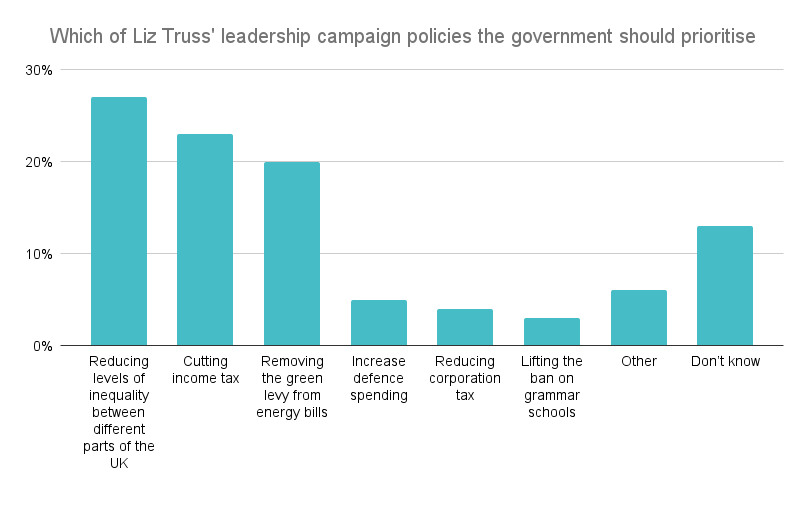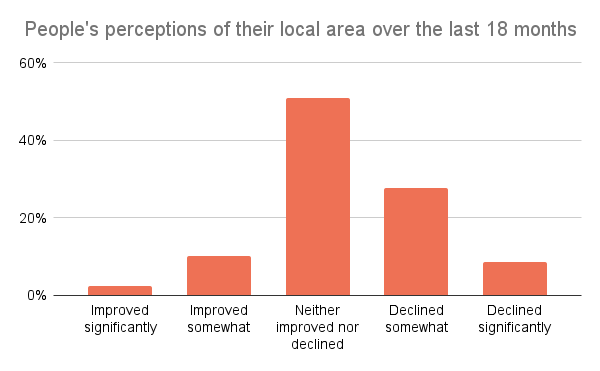Don’t leave levelling up behind
As conference season draws to a close and with a new prime minister at the helm, the future of levelling up seems to hang in the balance. Described by Boris Johnson as the ‘defining mission’ of his government, Liz Truss has been more ambiguous about her commitment to the agenda. During the Conservative leadership race and in the early days of the Truss premiership, Tory MPs in levelling up heartlands have repeatedly made the case for levelling up.
Against this backdrop of uncertainty, Demos and KPMG commissioned polling to find out just how popular the policy is among the people that really matter – the public.
Levelling up is more popular than tax cuts
In this turbulent period for policy and politics, it might be easy to suggest that levelling up should be put on the back burner. Our polling suggests that is not what the public wants. When listed alongside other policies put forward by Liz Truss during her leadership campaign, including ‘cutting income tax’ and ‘reducing corporation tax’, people still thought ‘reducing levels of inequality between different parts of the UK’ was the most important.
In recent weeks, Truss has stuck to her guns on tax cuts. In the Chancellor’s mini budget, they took centre stage, with cuts to the basic rate of income tax, stamp duty and a (since reversed) scrapping of the top rate of income tax. Despite the government’s continued focus on cutting taxes, only 23% of people said cutting income tax as the most important policy, whilst only 4% thought the government should prioritise reducing corporation tax.

Of all the policies proposed by Truss during the leadership contest, levelling up came out on top
Even during a cost of living crisis where rising energy bills are on many people’s minds, levelling up still came out on top of ‘removing the green levy from energy bills’. It also proved more popular than lifting the ban on grammar schools and increasing defence spending.
Although Labour and Conservative voters might disagree on exactly how to reduce regional inequality – with Labour voters preferring a new approach and conservatives more likely to stay faithful to the current model – support for the policy’s objectives transcends political divides.
Levelling up needs to be localised for people to really reap the benefits
This support for levelling up comes despite many people not yet feeling the effects in their local area – 87% of people had not seen improvements in their area in the last 18 months. Perhaps this is unsurprising given the long-termism that has always been important for the success of the levelling up agenda, but it does suggest that the current approach could be improved. It also presents a risk – how long will people continue to support the policy if they aren’t reaping the benefits where they live? Local knowledge and a desire among communities to see their areas thrive is a valuable resource – one which the government should not take for granted.

The public demand locally-led levelling up
This finding should not be cause for the government to abandon levelling up. Instead, there should be a doubling down on levelling up. Our polling also makes the case for further devolution, both to local authorities and to communities themselves. 71% of respondents thought it was important for local people to have a say in decisions that are made locally, with 50% unsatisfied with the amount of involvement currently offered to communities in policymaking. This compounds the findings of our recent report, Movers and Stayers, where people in Blyth and Mansfield told us they crave a greater say in local decision making. What’s more, trust in the national government to deliver local policy is low: only 16% of people think that the government understands the needs of their local area.
Investment Zones are an early indicator of the Government’s direction on levelling up. Here, there is some cause for optimism – namely the requirement for ‘local consent’ on which these investment zones will reportedly be based. However, this does not go far enough. Investment Zone applications will be ‘open to all’ areas, but the government has said it will ‘set a high bar for establishing them’. It is crucial for the government to show a stronger commitment to devolution and a genuinely participatory approach to strengthen local decision making and deliver levelling up at a local level.
Localise, localise, localise
This all points to a clear conclusion: to abandon levelling up would be a mistake. As our polling demonstrates, the public not only supports it, but would likely be willing to step up and help shape the policies to improve their communities and prospects. That’s why localisation of power to local governments and communities should be at the forefront of levelling up policy for this and any future government.
